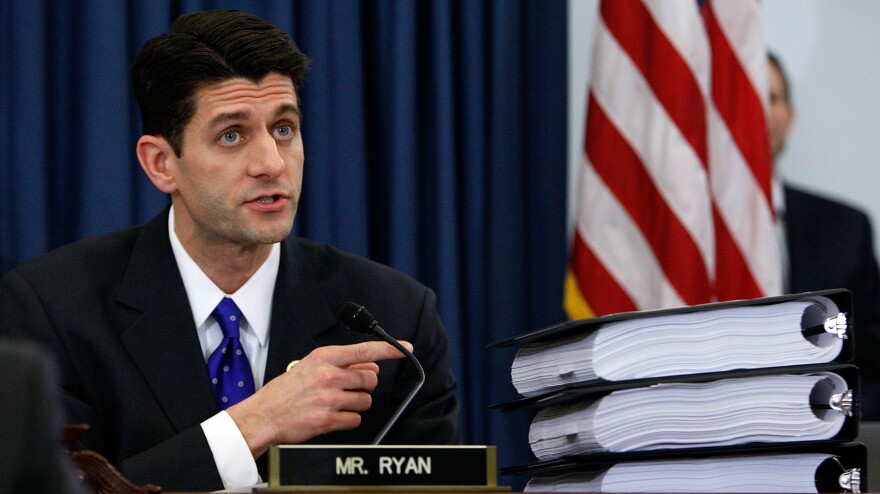The addition of Rep. Paul Ryan to the GOP ticket is certain to elevate health care as a campaign issue this fall. Most of the debate is likely to be about Medicare and Ryan's controversial plan to transform the popular program for the elderly and disabled.
But some of the attention is likely to focus on Medicaid, the health care program for those with low incomes, as well.
Medicaid — not Medicare — is actually the nation's largest health insurance program, covering some 60 million Americans with very limited incomes. But you'd be excused for not knowing that, because Medicaid doesn't get nearly as much attention as Medicare does.
That may be changing, however. The Supreme Court earlier this summer put the program in the news when it ruled that the Medicaid expansion in the 2010 health care law must be optional for states.
That's given more ammunition to Republicans, including presidential candidate Mitt Romney, who want to offer states far more responsibility for Medicaid.
"The state is the best place to determine what is the best way to help those poor," Romney said in a health care speech at the University of Michigan in 2011. "And so I would therefore block grant to the states' Medicaid funds, and say to the states, 'You now use these monies as you feel appropriate to care for your own poor.' "
Only there's a catch, said President Obama in a speech to Associated Press editors in April. Under the Republican congressional budget Romney has endorsed, Medicaid funding would not only be turned back to the states — it also would be cut substantially.
"They would have to be running these programs in the face of the largest cut to Medicaid that has ever been proposed," he said, "a cut that, according to one nonpartisan group, would take away health care from about 19 million Americans."
Among those, he said, would be "someone's grandparents who, without Medicaid, won't be able to afford nursing home care. ... Many are poor children. Some are middle-class families who have children with autism or Down syndrome. Some are kids with disabilities so severe that they require 24-hour care. These are the people who count on Medicaid."
But Republicans on Capitol Hill counter that Medicaid doesn't work very well.
"Medicaid is breaking the bank," said Rep. Tim Huelskamp, R-Kan., at a news conference last month.
Huelskamp was speaking in support of a House bill that would transform Medicaid from its current status — as an unlimited entitlement program whose costs are shared between the federal and state governments — to a limited block grant to each state.
"[Medicaid is] actually probably the worst care system that we have in the entire country," he said.
There's a reason Huelskamp and others make that claim. Over the years, many studies have shown that people with Medicaid coverage do worse than people with other health insurance coverage or people with no coverage at all.
But Medicaid researchers say those studies don't portray Medicaid accurately.
Katherine Baicker, a professor at the Harvard School of Public Health and a former economic adviser to President George W. Bush, says a lot of the studies haven't been able to control for the fact that people who get Medicaid tend to be in worse health than people who don't.
"It's not that Medicaid is causing the health outcomes to be bad; it's that people with more health needs — or potentially more serious health conditions — are the ones who more likely successfully sign up for Medicaid," she said in an interview.
But now that's changing. Last year, Baicker was part of a unique study that took place in Oregon. That state held a lottery for low-income adults to see who would gain Medicaid coverage and who wouldn't. That gave researchers a chance to make apples-to-apples comparisons on how Medicaid actually affects enrollees' health.
Its findings were almost uniformly positive.
"We found that gaining access to Medicaid increased health care use — and that was preventive care, doctor's office visits, but also hospitalizations," she said. "It dramatically reduced financial strain, such as lowering the likelihood of having a bad debt sent to collection, by 25 percent."
People who got Medicaid were also more likely to report being in better health as a result.
Baicker is also a co-author of a study out just last month in the New England Journal of Medicine. It compared three states that expanded Medicaid to low-income adults with three neighboring states that didn't. It wasn't as scientifically rigorous as the Oregon study, but it had a much larger study group.
"We found, in fact, that states that expanded Medicaid to that group of adults, relative to states that didn't, had substantially lower mortality," she said, meaning people who got Medicaid coverage were less likely to die than people who didn't.
The New England Journal of Medicine study couldn't tell if Medicaid was the reason for the lower mortality or not. But it does refute other studies suggesting that Medicaid is bad for people's overall health. And it's likely to serve as still more fodder as the political debate over Medicaid heats up this fall.
Copyright 2020 NPR. To see more, visit https://www.npr.org.



